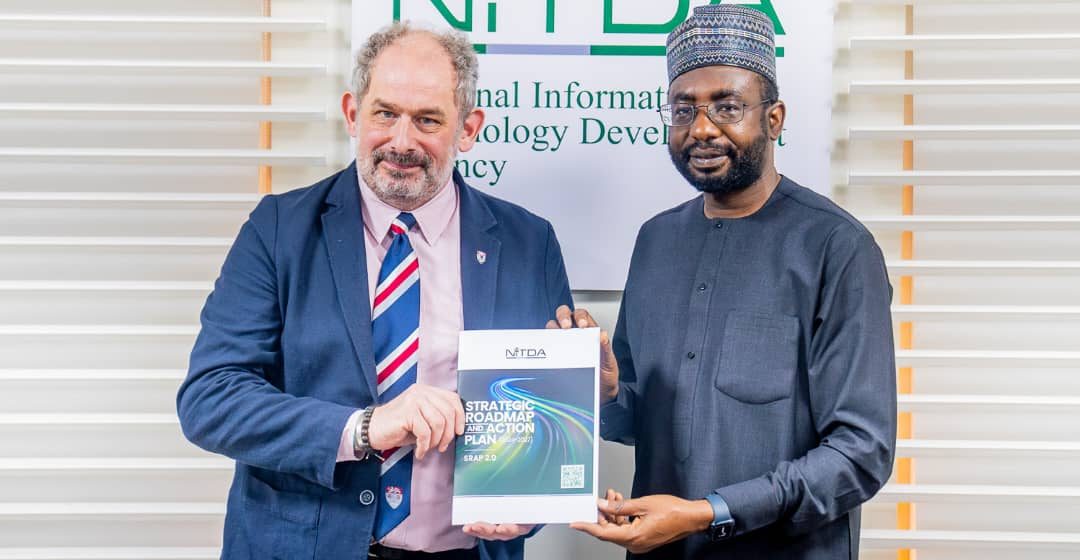The National Information Technology Development Agency’s (NITDA) Director General, Kashifu Inuwa, CCIE, has emphasized the importance of strong business, government, and academic cooperation in a renewed effort to harness innovation for sustainable national growth and youth empowerment. This call was made while a delegation from Lancaster University in the United Kingdom, led by Professor Kirk Semple, Director of International Research, was in Abuja for a working visit to NITDA’s corporate headquarters.
Exploring opportunities for strategic cooperation under the Research and Innovation Partnership for Entrepreneurship (RIPE) program—an endeavor to use academic research and innovation to promote entrepreneurial growth and economic transformation—was the main focus of the visit.
Inuwa told the delegation that the continent’s efforts to develop knowledge-based economies are still hampered by a massive research investment gap that affects both Nigeria and Africa as a whole. “Investing in research is essential if we are to create a strong and sustainable economy. There is a significant gap in Nigeria and Africa as a whole because we do not fund research in that area,” he stated.
Using the agricultural sector as an example, Inuwa noted that a large number of Nigerian farmers do not have access to vital data and digital tools that could transform resource efficiency and productivity. In order to solve such sector-specific problems and to inform laws and policies that can hasten digital transformation, he emphasized that research and development (R&D) is essential.
Inuwa went on to describe NITDA’s emphasis on cutting-edge technologies, pointing out that they have enormous potential to address regional issues and generate new business opportunities. These technologies include artificial intelligence (AI), the Internet of Things (IoT), unmanned aerial vehicles (UAVs), blockchain, robotics, and additive manufacturing.
“The objective is to establish a thriving ecosystem for technology research that brings together government, industry, academia, risk capital, and entrepreneurs,” he said.
He also emphasized the importance of matching academic programs to industry demands, urging universities to cultivate students who can use innovation to solve real-world problems. Inuwa cautioned against the inefficiencies of redundant efforts and urged improved coordination amongst stakeholders.
Inuwa also made reference to the eight strategic pillars that the Federal Government has determined are important for the advancement of the country. Increasing agriculture to achieve food security, unlocking energy and natural resources, improving infrastructure and transportation, concentrating on education, health, and social investment, accelerating diversification through industrialization and innovation, improving governance and service delivery, and reforming the economy for inclusive and sustainable growth are some of these.
Inuwa also emphasized NITDA’s Strategic Roadmap and Action Plan 2.0 (SRAP 2024–2027), which is organized around eight complementary pillars, in order to support these priorities. Developing a robust technology research ecosystem, fostering digital literacy and talent development, strengthening the legal framework and policy implementation, promoting inclusive access to digital infrastructure and services, enhancing cybersecurity and digital trust, fostering an innovative and entrepreneurial ecosystem, forming strategic partnerships and collaboration, and cultivating a vibrant organizational culture and an agile workforce are just a few of these goals at NITDA.
“We put a lot of emphasis on research because without it, you can not create regulations or policies that actually change the ecosystem,” Inuwa continued.
According to DG, the meeting was a major step forward in NITDA’s dedication to international cooperation, in line with the larger goals of President Tinubu’s Renewed Hope Agenda, and setting up Nigeria to lead the world’s digital economy through innovation driven by research.
Professor Kirk Semple emphasized Lancaster University’s reputation for conducting world-class research and its dedication to strategic partnerships that create value for society in his earlier remarks. He characterized the (RIPE) program as a means of mobilizing knowledge that goes beyond scholarly theory to real-world implementation.
There is pressure on universities nowadays to prove their worth beyond producing knowledge. “Strategic collaborations such as this one with NITDA support innovation, guarantee research-informed policy, and create significant community change,” Semple stated.
Additionally, he emphasized the importance of innovation in bridging the gap between academia and society, pointing out that universities are vital networks that provide organizations, particularly those without R&D capabilities, with access to the knowledge and resources needed to address global challenges like public health, climate change,



Leave a Reply